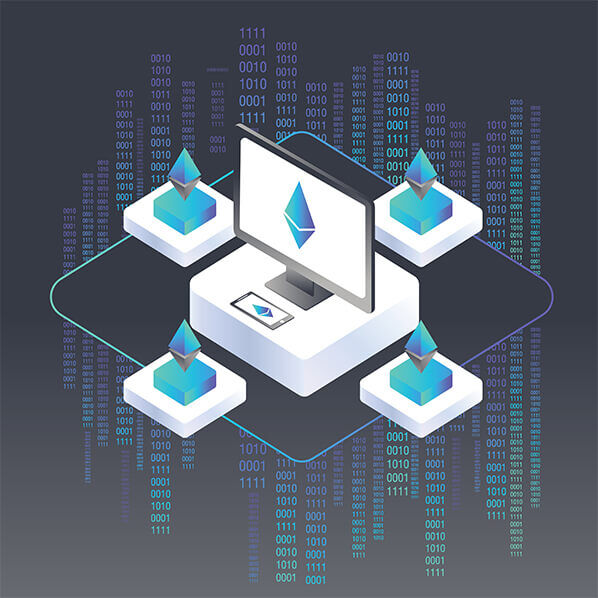In recent years, decentralized applications or Dapps have gained significant popularity and revolutionized various industries with their transparent, secure, and trustless nature. The demand for Dapp development is rising, and choosing the right blockchain is becoming crucial. In this blog, we will look at the key considerations when selecting a blockchain for Dapp development and the top contenders in the field.
Understanding Dapp Development
Before we get into the details of the best blockchain for Dapp development, it is important to understand the fundamentals of Dapps. Decentralized applications are built on blockchain technology, which ensures transparency, immutability, and security. Dapps operate on a peer-to-peer network by eliminating the need for intermediaries and giving users full control over their data and transactions. Companies hire Dapp developers to create the apps.
Key Considerations for Choosing a Blockchain
Scalability
One of the crucial features to consider while choosing a blockchain is scalability, especially as the user base is a growing parameter. If a blockchain is scalable, it can handle many transactions per second (TPS) without losing any speed or efficiency. Ethereum had faced scalability issues, leading to exploring alternative solutions like layer 2 solutions.
Smart Contract Functionality
Smart contracts are contracts that automatically execute themselves, as the terms of the agreement are encoded into computer programming. Blockchain having the ability to support strong, smart contracts is important for Dapp development. Ethereum is known for its smart contract capabilities, and other blockchains like Binance Smart Chain and EOS offer strong smart contract functionality.
Security
When it comes to Dapp development, security is something that we cannot ignore. To protect the user’s data and assets, the chosen blockchain must have. A strong security infrastructure. Some blockchain platforms like Tezos and Cardano have integrated security features that make these platforms attractive for developers.
Community Support
A strong community can impact the success of a blockchain and Dapps built on it. Currently, Ethereum has a large, active community of developers that nurtures innovations and collaborations. Also, newer blockchains like Solana and Polkadot are gaining significant support and recognition.
Interoperability
Interoperability paves the way for different blockchains to communicate and share information seamlessly. This is more than important for the overall growth of the blockchain ecosystem. One such platform is Polkadot, which enables the Dapp developers to take advantage of multiple blockchains within a single application.
Now, let’s explore some prominent blockchains and assess their suitability for Dapp development.
Ethereum
Ethereum is staying as the pioneer and dominant platform in Dapp development. When Ethereum introduced smart contracts, it was revolutionary, allowing developers to create decentralized applications using a solidity programming language. Ethereum has a mature ecosystem and thriving community, making it a popular choice among businesses entering the Dapp development sector.
Pros:
- Mature ecosystem
- Extensive developer community
- Well-established token standards (e.g., ERC-20, ERC-721)
Cons:
- Scalability challenges
- High gas fees during network congestion
Binance Smart Chain
Binance Smart Chain (BSC) helps improve Ethereum’s work by making things faster and cheaper. BSC also plays well with Ethereum projects, making it easy for them to switch over. This makes BSC a good choice for businesses that want quick transactions and affordable costs.
Pros:
- Faster transaction processing
- Lower transaction fees
- EVM compatibility for easy migration
Cons:
- Questions about decentralization due to centralized validator nodes
Polkadot
Polkadot brings a special way of making DApps (Decentralized Applications) with its multi-chain system, making different blockchains work together. This teamwork improves the ability to handle lots of things and lets DApps talk to each other on different blockchains. Polkadot’s Nominated Proof-of-Stake (NPoS) way of agreeing on things adds an extra level of security.
Pros:
- Interoperability between blockchains
- Scalability through a multi-chain framework
- Enhanced security with NPoS
Cons:
- Relatively new, with a growing but smaller developer community
Cardano
Cardano stands out from others by making security and sustainability a top priority. Its unique architecture separates the parts that keep track of things and the parts that do the work, which helps it handle more tasks efficiently. Cardano’s Ouroboros consensus algorithm is designed to be energy-efficient, addressing concerns about the environmental impact of blockchain networks.
Pros:
- Emphasis on security and sustainability
- Ouroboros consensus algorithm
- Layered architecture for improved scalability
Cons:
- Developing ecosystem compared to Ethereum or Binance Smart Chain
Tezos
Tezos is different because it lets the community make decisions about how the system should grow. It also has extra security features like smart contracts and formal checks, making Tezos a good choice for businesses that want a strong and flexible blockchain.
Pros:
- On-chain governance for protocol upgrades
- Smart contract functionality
- Emphasis on security through formal verification
Cons:
- Smaller developer community compared to Ethereum or Binance Smart Chain
The Role of Dapp Development Company
In the changing world of blockchain tech, a Dapp development company is super important. They help create the future of decentralized apps. These companies are experts in providing solutions for businesses and people who want to join the decentralized world. Whether getting talented Dapp developers, helping choose the right blockchain, or giving full development services, these companies ensure ideas become real.
Dapp Development Services:
Companies specializing in Dapp development offer services like smart contract development, DeFi solutions, NFT marketplaces, and custom Dapp creation. Their expertise helps businesses confidently navigate the complexities of blockchain technology.
Consultation and Strategy:
Choosing the right blockchain for Dapp development is crucial. Dapp development companies provide consultation services, helping clients assess their needs, understand blockchain strengths, and plan a strategic Dapp development approach. This ensures the chosen blockchain aligns with project goals and technical specifications.
Continuous Support and Maintenance:
Blockchain applications need ongoing support. Dapp development companies offer post-deployment services to ensure seamless and secure Dapp functionality. This includes monitoring for vulnerabilities, implementing updates, and addressing any issues.
Community Engagement:
Dapp development companies have strong ties to the blockchain community, benefiting businesses integrating Dapps. Community engagement fosters collaboration, provides access to resources, and opens doors to potential partnerships, contributing to Dapp’s success.
Conclusion
To sum up, selecting the right blockchain for Dapp development requires careful consideration of scalability, smart contract functionality, security, community support, and interoperability. While Ethereum is a strong choice, newer options like Binance Smart Chain, Solana, Polkadot, Cardano, and Tezos are gaining popularity, each offering unique features for specific needs.
For Dapp developers and businesses entering the decentralized scene, it’s crucial to assess their requirements and weigh the strengths of each blockchain. Whether you hire Dapp developers, partner with a blockchain Dapps development company, or explore blockchain Dapp development services, making an informed decision is key to unlocking the full potential of decentralized applications in the evolving digital landscape.
You may also like,
- What are Decentralized Apps (Dapps): A Business Guide
- Why is the Ethereum Blockchain Beneficial for Business?
- Top 10 Enterprise Blockchain Companies
- Is Blockchain the Future Of Technology







